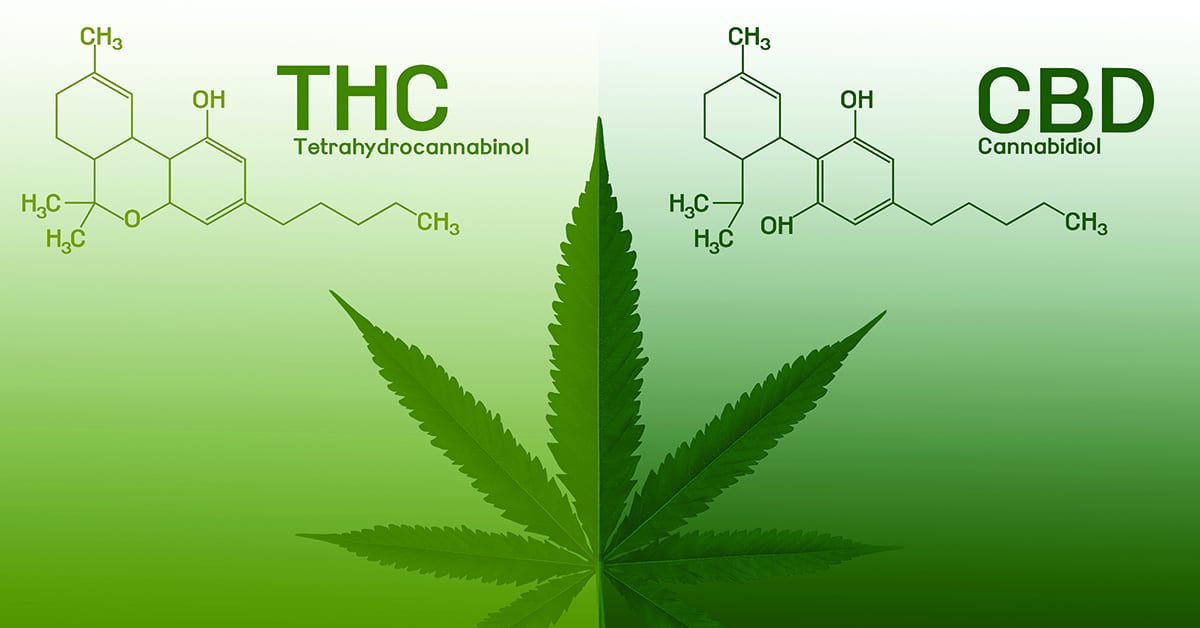

Understanding the Difference Between THC and CBD.
THC (Tetrahydrocannabinol) and CBD (Cannabidiol) are the two primary active compounds found in the cannabis plant. While both are derived from the same plant, they possess distinct properties and effects on the human body.
THC (Tetrahydrocannabinol):
THC is the psychoactive compound responsible for the "high" associated with cannabis use.
It interacts with the body's endocannabinoid system, activating the CB1 and CB2 receptors, which can lead to a range of physiological and psychological effects.
CBD (Cannabidiol):
CBD, on the other hand, is a non-psychoactive compound that does not produce the "high" associated with THC.
It interacts with the endocannabinoid system in a different way, often producing therapeutic effects without the psychoactive side effects.
Understanding the distinct properties of THC and CBD is crucial in determining the appropriate cannabis seeds for specific medical conditions and individual needs.
Medical Benefits of THC Cannabis Seeds.
THC-dominant cannabis seeds have been the subject of extensive research, revealing a wide range of potential medical applications. Here are some of the key benefits:
Pain Management:
THC has been shown to be effective in reducing chronic pain, including neuropathic pain, arthritis, and cancer-related pain.
It interacts with the body's pain receptors, modulating the perception of pain and providing relief.
Appetite Stimulation:
THC is known to increase appetite, making it beneficial for individuals struggling with wasting conditions, such as cancer, HIV/AIDS, or anorexia.
By stimulating the appetite, THC can help maintain a healthy weight and improve overall well-being.
Nausea and Vomiting Relief:
THC has been found to be effective in reducing nausea and vomiting, particularly in individuals undergoing chemotherapy or experiencing other medical conditions that cause these symptoms.
It interacts with the body's receptors responsible for controlling nausea and vomiting, providing relief.
Glaucoma Treatment:
Studies have shown that THC can help reduce intraocular pressure, making it a potential treatment for glaucoma, a leading cause of blindness.
By lowering the pressure within the eye, THC can help slow the progression of this debilitating condition.
Neurological Conditions:
THC has been explored as a potential treatment for various neurological conditions, such as multiple sclerosis, Parkinson's disease, and Alzheimer's disease.
It may help alleviate symptoms like muscle spasms, tremors, and cognitive impairment associated with these conditions.
Medical Benefits of CBD Cannabis Seeds.
In contrast to THC, CBD-dominant cannabis seeds have garnered significant attention for their unique therapeutic properties. Let's delve into some of the key medical benefits of CBD:
Anti-Inflammatory Properties:
CBD has been shown to possess potent anti-inflammatory properties, making it a promising treatment for conditions like arthritis, Crohn's disease, and inflammatory bowel diseases.
By reducing inflammation, CBD can help alleviate pain and improve overall well-being.
Anxiety and Depression Management:
Numerous studies have demonstrated the effectiveness of CBD in reducing symptoms of anxiety and depression.
It interacts with the body's serotonin receptors, which play a crucial role in regulating mood and emotional well-being.
Epilepsy and Seizure Control:
CBD has been approved by the FDA as a treatment for certain forms of epilepsy, such as Dravet syndrome and Lennox-Gastaut syndrome.
It has been shown to effectively reduce the frequency and severity of seizures in individuals with these conditions.
Neuroprotective Properties:
CBD has been explored for its potential neuroprotective effects, which may be beneficial for conditions like Parkinson's disease, Alzheimer's disease, and traumatic brain injuries.
Its antioxidant and anti-inflammatory properties may help protect the brain and nervous system from damage.
Skin Health and Dermatological Conditions:
CBD has been studied for its potential in treating various skin conditions, such as acne, eczema, and psoriasis.
Its anti-inflammatory and antimicrobial properties may make it a valuable addition to skincare regimens.
Research and Studies on the Medical Benefits of THC and CBD Cannabis Seeds.
The medical community has invested significant resources into understanding the therapeutic potential of THC and CBD. Here are some of the key research findings:
A Systematic Review on the Analgesic Effects of Cannabinoids:
A 2018 review published in the journal Pain Medicine analyzed 104 studies on the use of cannabinoids for pain management.
The review concluded that both THC and CBD-dominant cannabis preparations demonstrated significant analgesic (pain-relieving) effects, with THC-dominant formulations showing the most promising results.
The Effectiveness of CBD in Treating Epilepsy:
A 2019 study published in the New England Journal of Medicine examined the use of CBD in treating two rare and severe forms of epilepsy, Dravet syndrome and Lennox-Gastaut syndrome.
The study found that the addition of CBD to conventional anti-epileptic medications significantly reduced the frequency of seizures in these patients.
CBD's Potential in Treating Anxiety and Depression:
A 2019 review published in the journal Frontiers in Psychiatry explored the use of CBD for the treatment of anxiety and depression.
The review concluded that CBD has demonstrated promising anxiolytic (anxiety-reducing) and antidepressant-like effects, with the potential to be a valuable addition to the treatment of these mental health conditions.
The Anti-Inflammatory Properties of CBD:
A 2020 study published in the journal Biomolecules investigated the anti-inflammatory effects of CBD in various in vitro and in vivo models.
The study found that CBD exhibited potent anti-inflammatory properties, suggesting its potential as a therapeutic agent for inflammatory conditions.
These research findings highlight the growing body of evidence supporting the medical benefits of THC and CBD cannabis seeds, paving the way for further exploration and clinical applications.
How to Choose the Right THC and CBD Cannabis Seeds for Medical Use.
When it comes to selecting the appropriate THC and CBD cannabis seeds for medical use, there are several factors to consider:
Cannabinoid Profiles:
Identify the specific cannabinoid ratios (THC:CBD) that align with your medical needs.
For conditions where THC is the primary therapeutic agent, choose seeds with a higher THC content.
For conditions where CBD is the focus, opt for seeds with a higher CBD content.
Strain Characteristics:
Consider the specific strain characteristics, such as terpene profiles and growth patterns, to ensure you select the most suitable option for your medical needs and cultivation preferences.
Quality and Purity:
Prioritize sourcing cannabis seeds from reputable and regulated suppliers to ensure quality, purity, and consistency in the final product.
Legal Compliance:
Familiarize yourself with the local laws and regulations surrounding the cultivation, possession, and use of cannabis seeds for medical purposes.
Ensure that your chosen seeds and cultivation practices adhere to the applicable legal framework.
By carefully considering these factors, you can make an informed decision and select the THC and CBD cannabis seeds that best fit your unique medical requirements and personal preferences.
Methods of Consumption for THC and CBD Cannabis Seeds.
The method of consumption for THC and CBD cannabis seeds can significantly impact the onset, duration, and intensity of the desired effects. Here are some common consumption methods:
Inhalation:
Smoking or vaporizing cannabis seeds can provide rapid onset of effects, typically within minutes.
This method allows for precise dosing and control over the experience.
Oral Ingestion:
Consuming cannabis seeds in the form of edibles, tinctures, or capsules can result in a delayed onset of effects, usually within 30 minutes to 2 hours.
This method offers longer-lasting effects but may be less predictable in terms of dosing.
Topical Application:
Applying cannabis-infused topicals, such as creams or ointments, can target specific areas of the body and provide localized relief.
This method is particularly beneficial for addressing skin conditions or localized pain.
Sublingual Administration:
Placing cannabis tinctures or oils under the tongue can result in a quicker onset of effects compared to oral ingestion.
This method allows for efficient absorption of the active compounds through the mucous membranes.
It's important to experiment with different consumption methods and dosages to find the approach that works best for your individual needs and preferences.
Safety Considerations and Potential Side Effects of THC and CBD Cannabis Seeds.
While THC and CBD cannabis seeds are generally well-tolerated, it's essential to be aware of potential side effects and safety considerations:
THC-Dominant Cannabis Seeds:
Potential side effects may include dry mouth, drowsiness, impaired coordination, and short-term memory impairment.
High doses of THC can also lead to anxiety, paranoia, and increased heart rate.
CBD-Dominant Cannabis Seeds:
Potential side effects may include fatigue, diarrhea, changes in appetite, and interactions with certain medications.
CBD is generally considered well-tolerated, with a favorable safety profile compared to THC.
Dosage Considerations:
It's crucial to start with low doses and gradually increase as needed to find the optimal therapeutic effect while minimizing side effects.
Consulting with a healthcare professional can help you determine the appropriate dosage and consumption method for your specific needs.
Drug Interactions:
THC and CBD may interact with certain medications, such as blood thinners, antidepressants, and anti-seizure drugs.
It's essential to discuss the use of cannabis seeds with your healthcare provider to ensure safe and responsible use.
By being mindful of these safety considerations and potential side effects, you can maximize the therapeutic benefits of THC and CBD cannabis seeds while minimizing any associated risks.
Legal Considerations and Regulations Surrounding the Use of THC and CBD Cannabis Seeds for Medical Purposes.
The legal landscape surrounding the use of THC and CBD cannabis seeds for medical purposes varies significantly across different regions and jurisdictions. It's crucial to familiarize yourself with the applicable laws and regulations in your area:
Legalization Status:
In some countries and states, the cultivation, possession, and use of cannabis seeds for medical purposes may be legal, while in others, it may be restricted or prohibited.
Regulatory Frameworks:
Many regions have established regulatory frameworks that govern the cultivation, distribution, and use of medical cannabis, including specific requirements for licensing, product testing, and patient access.
Prescription Requirements:
In some cases, the use of THC and CBD cannabis seeds for medical purposes may require a valid prescription or recommendation from a licensed healthcare provider.
Possession Limits:
Certain jurisdictions may impose limits on the amount of cannabis seeds or products that individuals can possess for medical use.
Cross-Border Considerations:
If you plan to travel with or transport cannabis seeds, it's crucial to research the laws and regulations in the destination country or state to ensure compliance.
Staying informed about the legal landscape and adhering to the applicable regulations is essential to ensure the safe and responsible use of THC and CBD cannabis seeds for medical purposes.
Conclusion: Exploring the Future of Medical Cannabis and the Potential of THC and CBD Cannabis Seeds.
As we've explored in this comprehensive article, the medical benefits of THC and CBD cannabis seeds hold tremendous promise for a wide range of health conditions. From pain management and appetite stimulation to the treatment of neurological disorders and skin ailments, the therapeutic potential of these plant compounds is undeniable.
To learn more about the medical benefits of THC and CBD cannabis seeds and how to incorporate them into your healthcare regimen, I encourage you to schedule a consultation with a qualified healthcare provider. Together, we can explore the latest research, discuss your specific needs, and develop a personalized plan to unlock the healing power of these remarkable plant compounds.
As the scientific community continues to unravel the complexities of the endocannabinoid system and the role of THC and CBD, we can expect to see even more groundbreaking advancements in the field of medical cannabis. The future holds exciting possibilities, and I'm thrilled to be part of this journey towards a healthier, more holistic approach to healthcare.


DISCLAIMER: To comply with UK law, Discount Cannabis Seeds sells Cannabis Seeds for souvenir and collection purposes only. Discount Cannabis Seeds accepts no liability for customers purchasing them for any other purposes.

Office Address:
PLEASE NOTE OUR BUSINESS IS ONLINE ONLY, NO SEEDS ARE FOR SALE AT OUR OFFICE ADDRESS
49 Station Road
Polegate
East Sussex
BN26 6EA
Email:
[email protected]
TikTok

Find out about our experience with Trustpilot > DCS & TRUSTPILOT

Discount Cannabis Seeds have been awarded certification by Cannabis Professionals, CannaPro - the trade association for the UK’s cannabis industry.
Copyright © 2024,



